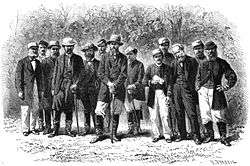Campaign of the Hills
The Campaign of the Hills (Spanish: Campaña de las Cordilleras) was the last campaign of the Paraguayan War, lasting from July 1869 to the end of the war on March 1, 1870. The Paraguayans were completely defeated by the Allies. Brazilian writer Alfredo d'Escragnolle Taunay, Viscount of Taunay took part in the campaign and later wrote about it. At least 5,000 Paraguayans were killed during this campaign.
| Campaign of the Hills | |||||||
|---|---|---|---|---|---|---|---|
| Part of the Paraguayan War | |||||||
 The Count of Eu and his military staff. | |||||||
| |||||||
| Belligerents | |||||||
| Commanders and leaders | |||||||
|
|
| ||||||
| Strength | |||||||
| 9,000[1]:101 | 30,757[1]:100–101 | ||||||
| Casualties and losses | |||||||
|
5,000 killed 1,100 wounded 1,200 captured |
201 killed 259 wounded | ||||||
Background
After the occupation of the Paraguayan capital, Asunción, by the allies, Marshal Luis Alves de Lima e Silva, Duke of Caxias considered the Paraguayan War to be ended with Allied victory. The marshal asked to be relieved of command on 12 Jan. 1869. On 16 April 1869, Prince Gaston, Count of Eu took command of the Allied Army Headquarters in Luque, two days after his arrival in Asunción.[1]:99–100
Since Paraguayan President López refused to surrender, the Allies installed a triumvirate.[1]:99 Cirilo Antonio Rivarola, a political opponent of López, as temporary President in occupied Asunción, and decided to continue the war. López decided to resist the Allies in the mountainous region of Northeastern Paraguay. López organized a force of 9,000 men and boys from his headquarters in Cerro León.[1]:101
Battle of Piribebuy
The Allied attack on the town of Piribebuy, then serving as a temporary capital for the Paraguayan government, lasted 5 hours, ending with the capture of the town and destruction of its official records
Battle of Acosta Ñu
The last major battle, in which Bernardino Caballero (who later became President of Paraguay) fought a Brazilian-Argentine combined force of 20,000 under Emperor Pedro II's son-in-law Prince Gaston and future Brazilian president Manoel Deodoro da Fonseca.[2]
Battle of Cerro Corá
The last battle of the campaign was at Cerro Corá, in which a Brazilian force of 4,000 wiped out President López's personal guard of 100-250 soldiers, killing López, Vice President Sánchez and López's son Juan Francisco.
References
- Hooker, T.D., 2008, The Paraguayan War, Nottingham: Foundry Books, ISBN 1901543153
- Gabriele Esposito (20 March 2015). Armies of the War of the Triple Alliance 1864–70: Paraguay, Brazil, Uruguay & Argentina. Osprey Publishing. p. 19. ISBN 978-1-4728-0725-0.
Bibliography
- Díaz Gavier, Mario, En tres meses en Asunción, Ed. del Boulevard, Rosario, Argentina, 2005. ISBN 987-556-118-5
- Doratioto, Francisco, Maldita Guerra. Nueva Historia de la Guerra del Paraguay, Ed. Emecé, Sao Paulo/Buenos Aires, 2008, pág. 30-35. ISBN 978-950-04-2574-2
- León Pomer, La guerra del Paraguay, Ed. Leviatán, Bs. As., 2008. ISBN 978-9505638536
- Rosa, José María, La guerra del Paraguay y las montoneras argentinas. Buenos Aires: Hyspamérica, 1986. ISBN 950-614-362-5
- Ruiz Moreno, Isidoro J., Campañas militares argentinas, Tomo IV, Ed. Emecé, Bs. As., 2008. ISBN 978-950-620-257-6
- Zenequelli, Lilia, Crónica de una guerra, La Triple Alianza, Ed. Dunken, Bs. As., 1997. ISBN 987-9123-36-0
External links
| Wikimedia Commons has media related to War of the Triple Alliance. |
- «La Guerra del Paraguay (Visión Argentina)», en LaGazeta.com.ar.
- «La Guerra del Paraguay», en ElOrtiba.org.
- «La guerra de la Triple Alianza en la literatura paraguaya», en NuevoMundo.revues.org.
- Fotos de la guerra de 1870, en Meucat.com.
- «La Guerra de la Triple Alianza», en ElHistoriador.com.ar.
- «La guerra del Paraguay», en Temakel.com.
- «South American Military History», en Reocities.com.
- Mapa de la Guerra de la Triple Alianza.